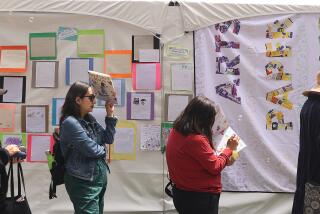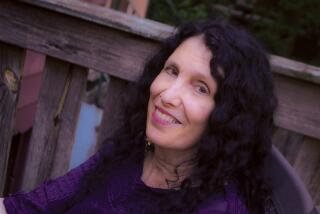Remembering Sylvia Plath
Fifty years ago Monday, Sylvia Plath, a 30-year-old American living in England, put her head in her oven and committed suicide. Her two children were upstairs; her husband, the poet Ted Hughes, had left her after a tempestuous relationship. Her poetry and the semi-autobiographical novel “The Bell Jar” have become lasting parts of our literary culture.
Today, Plath is much remembered -- and specifically, she’s being remembered online.
Poet Craig Morgan Teicher looks at the poems in Plath’s debut collection, “The Colossus,” at NPR: “The strange psyche at the core of these poems is made powerful by its seemingly limitless ability to endure self-destruction ... . As tragic and dark as her end would be, it’s nonetheless thrilling to watch this great artist becoming herself.”
The Academy of American Poets lists 10 things Plath loved, including hot baths and sherry.
Jillian Becker, a friend, talks with the BBC about Plath’s last days, when she hosted the poet and her children: “later she asked me to come and sit beside her, showed me bottles of pills and told me which of them helped her to sleep and which got her going in the morning.” After Becker’s husband took them home, Plath committed suicide.
At the Guardian, several women weigh in on Plath’s legacy. “These days depression is the stuff of postprandial dinner-party prattle, but Plath explored the condition with no sense of its being a ‘condition’ that others shared, no established therapeutic vocabulary, and no Prozac,” writes Lionel Shriver. And Lena Dunham asks, “Would she have been a riot grrrl, embracing an angry feminist aesthetic? Addicted to Xanax? A blogger for Slate?”
Blogging at Slate, Katie Roiphe posits an idea that seems calculatingly controversial. “Quite sensibly biographers and critics have always thought that Plath’s most famous poem, “Daddy,” was about her father,” she writes. “I would like to float out the theory that it is really about her mother.”
Biographer Paul Alexander writes in the Boston Globe, “When her poetry collection ‘Ariel’ appeared in 1966, it became a sensation. Using vivid, precise language, Plath documented subjects vital to her — motherhood, marriage, betrayal, suicide. In poems like ‘Daddy’ and ‘The Applicant,’ searing indictments of a disloyal husband, Plath accosted Hughes with a fury rarely seen in literature. Hers was a singular, powerful female voice. That rage, brought on by Hughes but also the general circumstances of her life, resonated with women.”
There have been many excellent studies of Plath and her work, but ultimately, her writing is what matters. The Poetry Foundation has 23 of her poems online.
ALSO:
An emasculated man battles back in ‘Fight Song’
‘Give Me Everything You Have’ is stalking victim’s tale
All in the family: Alexander Stille gets personal about memoir
Carolyn Kellogg: Join me on Twitter, Facebook and Google+
More to Read
Sign up for our Book Club newsletter
Get the latest news, events and more from the Los Angeles Times Book Club, and help us get L.A. reading and talking.
You may occasionally receive promotional content from the Los Angeles Times.







